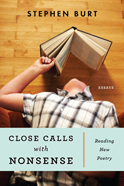Each day leading up to the March 11 announcement of the 2009 NBCC award winners, Critical Mass highlights one of the thirty finalists. Today, NBCC board member James Marcus discusses criticism finalist Stephen Burt's Close Calls with Nonsense: Reading New Poetry (Graywolf)
Stephen Burt introduces his superb essay collection with a wonderfully deflationary gambit. The pieces gathered in Close Calls with Nonsense, he suggests, resemble the sort of instructions that accompany a furniture purchase from IKEA. “The aesthetic criticism of poetry has something in common with those instructions,” he writes, “at all times but especially in our time, when so much poetry comes in flat packs and in pieces, relying on us to put it together ourselves.” Now, it’s hard to figure out the bigger challenge: confronting the thorniest of the Language poets or constructing an IKEA medicine cabinet. But in this age, when the most vital and adventurous verse does require some home assembly, Burt is an essential guide.
He is also a man with a mission. Which is to say that Close Calls with Nonsense is a miscellany, but also an attempt to define (loosely, lucidly) a generation of poets. Many of these poets began publishing in the 1990s, and many share a preference for persona over plot, a freewheeling approach to grammar and diction, and a gnawing suspicion that language itself is a form of entrapment. Burt is properly skeptical about the Procrustean task of roping these strays into a herd. Instead he describes them as “poets who share tactics, interests, and a generation, but who often have not met, and who would not fit comfortably (let alone consciously) into any school.” Point taken. Still, Burt really is mapping a new constellation of talents—maybe a data cloud is more like it—and it’s exhilarating to see the big picture slowly coming into focus.
He is equally adept when it comes to the nuts and bolts of a particular poetic personality. Take the extraordinary Rae Armantrout, who is older than many of Burt’s subjects and might be called, at least for some of them, a tutelary spirit. Her stubby, self-doubting, anti-lyrical lines evoke William Carlos Williams. Burt nails this connection in a concise paragraph, even as he notes the linguistic scruples that distinguish Armantrout from her predecessor: “Like Williams, Armantrout appreciates small, ignored, manufactured things, and feels relatively little attraction to nonhuman nature. Unlike Williams, she’s anxious about ‘use.’ ‘When names perform a function,’ a ‘stubborn old woman’ explains in a poem called ‘A Story,’ ‘that’s fiction.’ Armantrout’s wary, oppositional termperament, her resistance to fictions and functions, was hers from the start: all she had to do was find her own forms for it.”
Burt is especially good when it come to the inextricable tangle of strengths and limitations that mark any gifted poet. Of Mary Leader, he writes: “Although Leader offers plenty of verbal beauty, she is not always verbally reliable—her poems can sound amateurish in both the good and the bad senses of that word.” Thom Gunn strikes him as too self-conscious an operator of his own syntactical machinery, too reluctant to paint (as the saying goes) what he sees. Yet here too there are hidden strengths. If Gunn’s “commitment to knowing what he is doing—and his skittishness about seeing—debars him from the visionary, fantastic power of, say, Hart Crane, [he] offers instead the modest virtues of clarity and reliability, and the ability to bring into language the senses that most language, most poets, ignore.”
Clarity and reliability are not actually modest virtues. Among critics, in fact, they are often in short supply. Burt has both, along with lightly-worn erudition and a low-key sense of humor, without which the critical enterprise is a bust. (He has written an earlier book on Randall Jarrell, but has wisely declined to imitate his hero’s fizzling enthusiasms and lethal one-liners.) Allan Peterson, he tells us, “aspires to make the world as attractive to us as it is to well-treated, smart dogs.” That’s not a formulation we would have heard from, say, Helen Vendler (not to mention Matthew Arnold). Yet in Burt’s analysis, it’s exactly right. And for those readers reluctant to see themselves as four-legged friends, he’s got a gentle rejoinder: “If you think this aspiration trivial, you haven’t spent time with well-treated dogs.”
Click here to visit Stephen Burt's blog Close Calls with Nonsense


